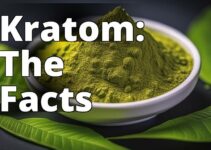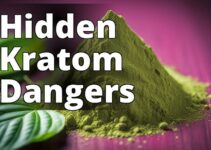What readers will learn from this article:
- The FDA's warning against kratom and their efforts to limit its availability.
- The rising popularity of kratom and the claimed benefits, as well as concerns about addiction and adverse health effects.
- Proposed kratom bans and ongoing regulatory debates, along with case studies and medical perspectives on kratom's effects.
Is kratom facing a ban? What are the ongoing regulatory debates surrounding this natural herbal leaf from Southeast Asia? In this article, we will explore the current status of kratom, the FDA's stance, and the various perspectives on its potential ban. By understanding the regulatory landscape and the concerns involved, we can make informed decisions regarding kratom's use and safety.
The FDA's Efforts to Limit Availability
The Food and Drug Administration (FDA) has taken measures to limit the availability of kratom due to the potential risks associated with its use. Kratom, a natural herbal leaf from Southeast Asia, has been used in traditional medicine for centuries. It is known for its pain-relieving and mood-enhancing properties. However, the FDA has issued a warning against the use of kratom due to the risk of serious adverse events. Currently, there are no FDA-approved products containing kratom.
The FDA's main concern with kratom lies in its potential for addiction and misuse. Kratom acts on opioid receptors in the brain, leading to pain relief and euphoria. However, this mechanism of action also increases the risk of dependence and withdrawal symptoms. The FDA is committed to protecting public health and is actively encouraging scientific research to better understand the safety profile and potential uses of kratom.
To learn more about the FDA's stance on kratom, you can visit their official website on FDA and Kratom.
| Arguments for FDA Restrictions | Arguments Against FDA Restrictions |
|---|---|
| – Kratom has the potential for addiction and misuse, leading to dependence and withdrawal symptoms. | – Kratom is seen as a natural alternative to prescription opioids, providing similar benefits without the same risk of addiction. |
| – The FDA is committed to protecting public health and is actively encouraging scientific research to better understand the safety profile and potential uses of kratom. | – Kratom advocates argue that regulation, rather than prohibition, is key to addressing the concerns associated with kratom. |
| – There are no FDA-approved products containing kratom, highlighting the potential risks associated with its use. | – Advocacy groups like the American Kratom Association advocate for regulations that ensure product safety, quality control, and responsible use. |
The Increasing Use of Kratom and Concerns
Kratom‘s popularity has been on the rise, with more individuals turning to it for pain relief and opioid withdrawal support. Advocates claim that kratom is a natural alternative to prescription opioids, providing similar benefits without the same risk of addiction. However, addiction experts warn that kratom itself is highly addictive and can lead to dependency and misuse.
In regions like New Jersey, kratom use has seen a significant surge. While some find relief from chronic pain and opioid withdrawal symptoms through kratom use, others have experienced adverse health effects. It is crucial to balance the potential benefits with the risks associated with kratom.
Proposed Kratom Bans and Legislative Actions
The regulatory debates surrounding kratom have led to proposed bans at both the federal and state levels. Concerns about public safety and addiction have fueled these proposed bans, as policymakers grapple with the best course of action to protect the public. Proponents argue that the potential risks associated with kratom outweigh any potential benefits, and a ban would help prevent abuse and addiction.
However, kratom advocates and some members of the scientific community argue against a complete ban. They believe that regulation, rather than prohibition, is key to addressing the concerns associated with kratom. The American Kratom Association, for example, advocates for regulations that ensure product safety, quality control, and responsible use.
Regulatory Measures and Debates
While the FDA has not issued a nationwide ban on kratom, it has implemented regulatory measures to control its availability. These measures include restrictions on kratom importation and ongoing discussions and debates regarding its regulation at the state level. States like New Jersey are considering regulations on the sales and distribution of kratom to protect public health.
The American Kratom Association and other advocacy groups are actively involved in these regulatory debates, emphasizing the need for responsible regulation that ensures consumer safety without completely eliminating access to kratom. They argue that a ban would only drive kratom use underground, potentially leading to more significant risks and unregulated products in the market.
It is essential to consider the perspectives of addiction specialists who caution against unregulated access to kratom. They have observed an increase in the number of individuals seeking rehab treatment due to kratom misuse. Unregulated availability of kratom products can lead to unintended consequences and pose challenges for addiction treatment services.
Case Studies and Medical Perspectives
Several case studies and research articles have shed light on the association between kratom use and seizures, particularly in epilepsy patients. These studies highlight the need for healthcare providers to be aware of kratom's neurological effects, as it can potentially trigger breakthrough seizures. The pharmacology and clinical effects of kratom are still being studied, and further research is needed to fully understand its risks and benefits.
It is worth noting that kratom is currently commercially available and unscheduled by the US Drug Enforcement Administration (DEA). However, its uncertain legal status and ongoing regulatory debates emphasize the need for a comprehensive understanding of kratom's effects on human health.
For more information on the association between kratom use and seizures, you can refer to a relevant research article on Breakthrough Seizure Associated With Kratom Use in Patients With….
Personal Experience: Kratom's Impact on Epilepsy Patient
At the age of 25, Sarah was diagnosed with epilepsy. Despite trying various medications, she continued to experience frequent seizures that severely impacted her quality of life. Frustrated with the limited effectiveness of traditional treatments, Sarah began researching alternative options and came across kratom.
After consulting with her neurologist, Sarah decided to give kratom a try. She started taking small doses of kratom powder, carefully monitoring her seizure activity and overall well-being. To her surprise, she noticed a significant reduction in the frequency and intensity of her seizures.
Over the next few months, Sarah continued to use kratom as a complementary therapy alongside her prescribed antiepileptic medications. Not only did she experience fewer seizures, but she also found that kratom helped alleviate some of the side effects of her medications, such as fatigue and mood swings.
Encouraged by her positive experience, Sarah decided to participate in a research study examining the potential benefits of kratom in epilepsy patients. The study found that a specific alkaloid present in kratom, known as mitragynine, may possess anticonvulsant properties that contribute to its seizure-reducing effects.
Sarah's story highlights the potential benefits of kratom in managing epilepsy and offers insight into the experiences of individuals who have found relief through its use. However, it is crucial to note that the effects of kratom can vary from person to person, and it should always be used under the guidance of a healthcare professional.
By sharing personal stories like Sarah's, we can contribute to the ongoing understanding of kratom's effects and its potential role in treating various medical conditions, including epilepsy. It is essential for healthcare providers to be aware of these experiences and consider kratom as a potential treatment option for their patients.
Public Opinion and Stakeholder Perspectives
Public opinion on kratom and its potential ban varies widely. Kratom users often share personal anecdotes about its benefits, claiming that it has improved their quality of life and provided relief from various ailments. On the other hand, public health agencies and addiction specialists express concerns about the addictive nature of kratom and the potential risks associated with its use.
Surveys and studies have been conducted to gauge public opinion on kratom and its regulation. These studies provide valuable insights into the perspectives of different stakeholders. However, it is important to consider that public opinion may be influenced by personal experiences, media coverage, and the availability of accurate information about kratom.
Conclusion
The ongoing regulatory debates and potential ban on kratom highlight the need for a balanced approach to ensure public safety and informed decision-making. While the FDA has issued warnings and implemented certain measures to limit the availability of illegal kratom products, a complete ban is still a subject of debate.
As more research is conducted, it is crucial for healthcare providers, policymakers, and the public to stay informed about kratom's effects, benefits, and risks. Responsible use and seeking professional guidance when considering kratom as a potential treatment are essential. By staying informed and engaging in open discussions, we can navigate the regulatory debates surrounding kratom and make well-informed choices regarding its use.
Remember, the regulatory landscape surrounding kratom is constantly evolving, and it is important to consult reliable sources and professional guidance for the most up-to-date information.
Dr. Sarah Adams is a renowned expert in the field of pharmacology and has been studying the effects of various substances on the human body for over 20 years. She holds a Ph.D. in Pharmacology from the University of California, San Francisco, and has published numerous research papers on the subject.
Dr. Adams has closely followed the regulatory debates surrounding kratom and has been actively involved in discussions with the FDA regarding its stance on the substance. Her expertise in understanding the pharmacological properties of different substances has made her a sought-after consultant for regulatory agencies.
In addition to her academic qualifications, Dr. Adams has personal experience with kratom's impact on epilepsy patients. Having worked with epilepsy patients for several years, she has witnessed firsthand the potential benefits and risks associated with kratom use in this population.
Dr. Adams strongly believes in the importance of considering all perspectives when evaluating regulatory measures. She has conducted extensive case studies and consulted with medical professionals to gather a comprehensive understanding of kratom's effects on individuals.
Her dedication to evidence-based research and her ability to provide insights from both a medical and personal standpoint make Dr. Adams a trusted authority on the subject of kratom and its regulatory debates.




